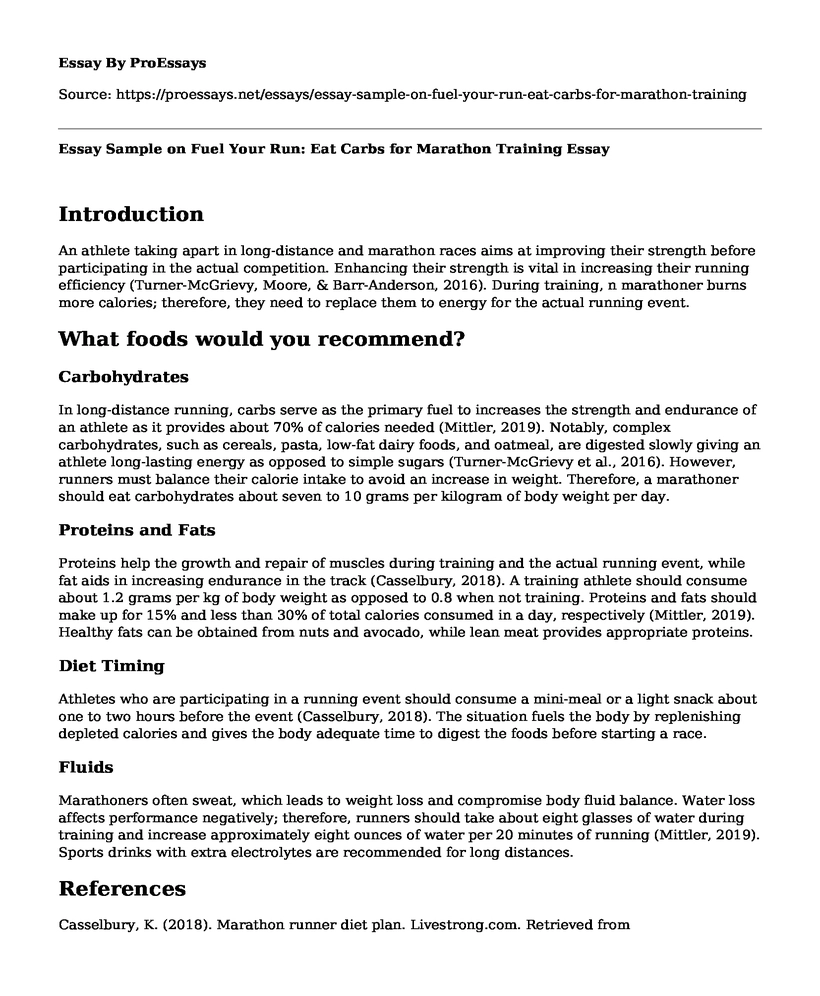Introduction
An athlete taking apart in long-distance and marathon races aims at improving their strength before participating in the actual competition. Enhancing their strength is vital in increasing their running efficiency (Turner-McGrievy, Moore, & Barr-Anderson, 2016). During training, n marathoner burns more calories; therefore, they need to replace them to energy for the actual running event.
What foods would you recommend?
Carbohydrates
In long-distance running, carbs serve as the primary fuel to increases the strength and endurance of an athlete as it provides about 70% of calories needed (Mittler, 2019). Notably, complex carbohydrates, such as cereals, pasta, low-fat dairy foods, and oatmeal, are digested slowly giving an athlete long-lasting energy as opposed to simple sugars (Turner-McGrievy et al., 2016). However, runners must balance their calorie intake to avoid an increase in weight. Therefore, a marathoner should eat carbohydrates about seven to 10 grams per kilogram of body weight per day.
Proteins and Fats
Proteins help the growth and repair of muscles during training and the actual running event, while fat aids in increasing endurance in the track (Casselbury, 2018). A training athlete should consume about 1.2 grams per kg of body weight as opposed to 0.8 when not training. Proteins and fats should make up for 15% and less than 30% of total calories consumed in a day, respectively (Mittler, 2019). Healthy fats can be obtained from nuts and avocado, while lean meat provides appropriate proteins.
Diet Timing
Athletes who are participating in a running event should consume a mini-meal or a light snack about one to two hours before the event (Casselbury, 2018). The situation fuels the body by replenishing depleted calories and gives the body adequate time to digest the foods before starting a race.
Fluids
Marathoners often sweat, which leads to weight loss and compromise body fluid balance. Water loss affects performance negatively; therefore, runners should take about eight glasses of water during training and increase approximately eight ounces of water per 20 minutes of running (Mittler, 2019). Sports drinks with extra electrolytes are recommended for long distances.
References
Casselbury, K. (2018). Marathon runner diet plan. Livestrong.com. Retrieved from https://www.livestrong.com/article/191974-marathon-runner-diet-plan/
Mittler, M. (2019). How to eat when training for a marathon - Nutrition for endurance athletes. Fitness Blender. Retrieved from https://www.fitnessblender.com/articles/how-to-eat-when-training-for-a-marathon-nutrition-for-endurance-athletes
Turner-McGrievy, G. M., Moore, W. J., & Barr-Anderson, D. (2016). The interconnectedness of diet choice and distance running: Results of the Research Understanding the Nutrition of Endurance Runners (RUNNER) Study. International Journal of Sports Nutrition and Exercise Metabolism, 26(3), 205-211. https://doi.org/10.1123/ijsnem.2015-0085
Cite this page
Essay Sample on Fuel Your Run: Eat Carbs for Marathon Training. (2023, Jan 29). Retrieved from https://proessays.net/essays/essay-sample-on-fuel-your-run-eat-carbs-for-marathon-training
If you are the original author of this essay and no longer wish to have it published on the ProEssays website, please click below to request its removal:
- Digitalizing Medical Records as a Strategy of the Clinic
- Weight Loss and Maintenance Paper Example
- Eat Healthy to Prevent Type II Diabetes: Diet's Role in Diabetes Prevention - Research Paper
- Essay Example on FDA Takes Action to Safeguard Public Health from Radiation Emitting Products
- Paper Example on Lifestyle Choices Affecting Biological Changes: Healthcare, Exercise, Diet, Drugs
- Free Report on Navigating Gender Transition: Challenges and Considerations in Pediatric Care
- Essay Sample on Levels of Policy







